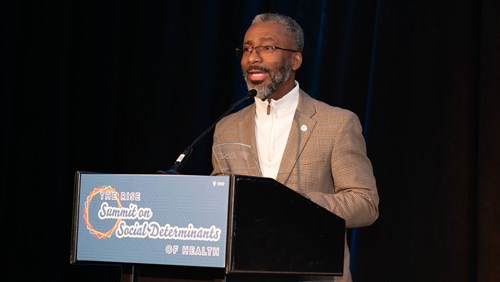The CEO of U.S. Hunger received the RISE Health Care Hero Award on Tuesday, April 4 at The RISE Summit on Social Determinants of Health in Chicago.
 RISE is pleased to announce that Rick Whitted, CEO of U.S. Hunger, is this year’s winner of the RISE Health Care Hero Award.
RISE is pleased to announce that Rick Whitted, CEO of U.S. Hunger, is this year’s winner of the RISE Health Care Hero Award.

The Health Care Hero Award is a prestigious award presented each year at The RISE Summit on Social Determinants of Health. It acknowledges an individual’s effort to make a significant impact on the lives of underserved populations through health care and/or social services interventions, and through superior example of the RISE mission to promote health equity among all patients.
RISE received a total of 56 nominations for this year’s award. Whitted was chosen for his leadership and innovation in addressing food insecurity while also tackling the systemic causes of hunger and dramatically improving health and wellbeing.
Whitted joined U.S. Hunger as a board member in 2017 and became CEO in 2020. He has led several initiatives to further the fight against hunger, including a virtual food bank program, meal packaging events, and disaster relief worldwide. In 2022, Whitted and his team ran 198 Hunger Projects, packaging nearly nine million meals for families in need around the world. Through his unprecedented work in targeting the root causes behind food insecurity, Whitted has also led U.S. Hunger in collecting more than 160,000 survey responses to date from individuals who have shared their experiences with food insecurity.
“Rick Whitted is redefining how our industry approaches the interconnectedness between hunger and health. Rick recognized that food is just the beginning. He has committed to listening, documenting, and preserving the real-life stories of those affected by food insecurity. These collected voices provide the insight to address root causes and drive lasting change,” said the nomination.
Whitted credits a “fortunate misfortune” in his mid-to-late 20s for what eventually led to his work at U.S. Hunger. Taking a two-year hiatus from banking to start his own business, Whitted put everything he had into a new company. Opening just prior to the 9/11 tragedy in 2001, the economic downturn that followed caused him to lose everything in a matter of months. Completely bankrupt at age 28, with a growing family to support, Whitted experienced food insecurity firsthand. “I had too much pride and shame to go to food bank. So, we had family bringing us boxes of food from the pantry,” he said. “It was the most humbling thing I’ve ever experienced.”
Though his family’s experience with food insecurity was temporary, it provided Whitted with a greater sensitivity and understanding of how to better address food insecurity.
“Chronic food insecurity feels no different than seasonal food insecurity, and the most important barrier to address is not access to a benefit of some kind but addressing the barrier of shame,” Whitted said. “Our organization’s programmatic pillars are dignity and discretion. We understand the importance of this being a private conversation. SDoH is not data, it’s not clinical. It’s family, it’s my child, it’s ‘am I safe’, it’s ‘someone’s screaming at me at home’, it’s ‘I don’t have enough money’, it’s groceries, it’s ‘I won’t eat so my kid can eat’. I think we underestimate just how much we’re asking of someone to have that conversation with a complete stranger.”
Nominations are being accepted for the 2024 award. Nominations must be submitted by December 31, 2023. The award will be presented at The RISE Summit on Social Determinants of Health on April 15-17, 2024, at the Hyatt Regency New Orleans.
